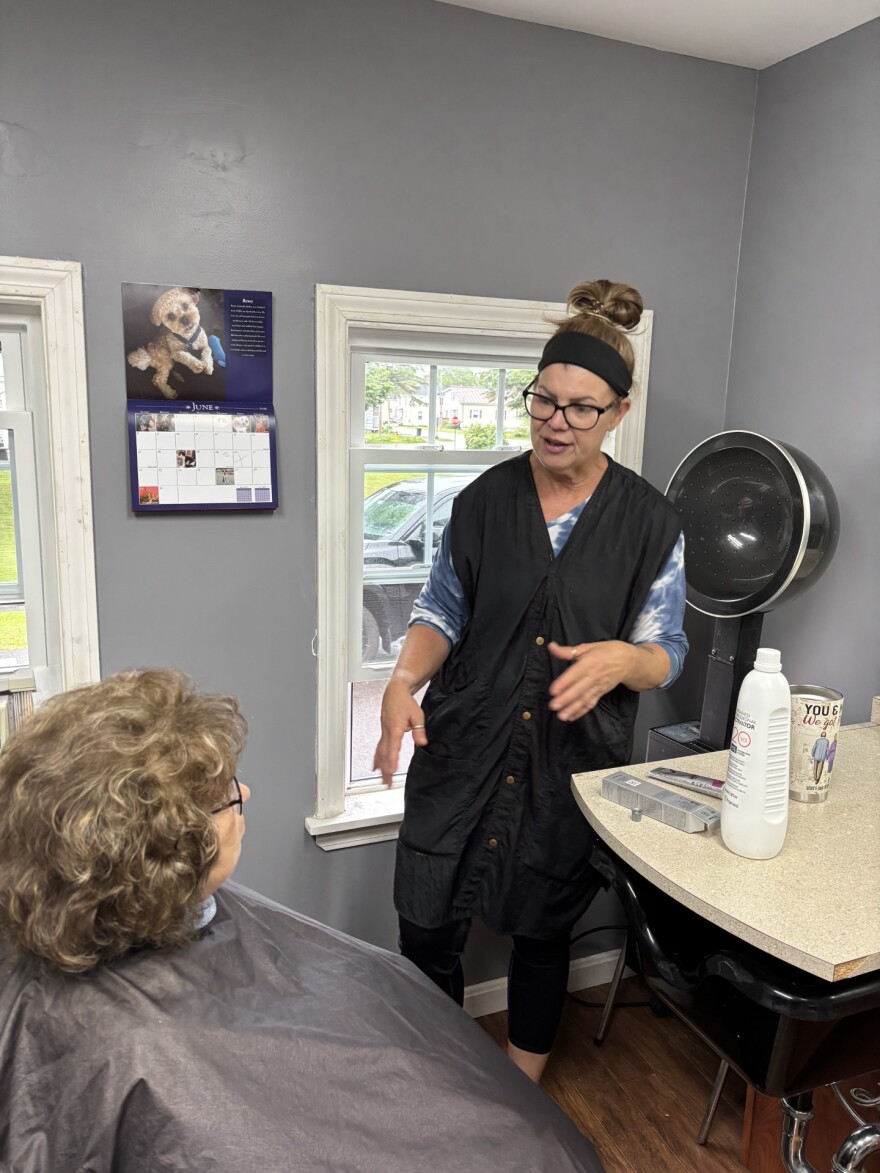More than 64,000 Mainers have health insurance through the Affordable Care Act's online marketplace. But state officials and health care advocates say that many would lose coverage under proposed changes in the Congressional budget bill. And some say that the changes — which could get a senate vote by the end of the week — would threaten the very stability of Maine's overall health care system.
Like any good hairstylist, Stephanie Boardman-Wallace isn't just skilled with cuts and color, she's great with people.
She and a client laugh as she prepares to color their hair in a small salon she operates out of her home in Fairfield.
Client: "Yeah, it got gray."

Boardman-Wallace: "You did. You're a month overdue!"
For years, Boardman-Wallace had health insurance through her husband's work. When he became disabled a few years ago they lost coverage, so she took an additional job that offered insurance. But she left several months ago and returned to hairstyling to have more flexibility to care for her mother.
"Of course, being self employed, I don't have any benefits, so I looked to the Affordable Care Act," she said.
Boardman-Wallace said she was able to find a plan she could afford on her tight budget. It costs $160 a month.
"It's been working great, and it's there if I need it, so it's comforting," she said.
Boardman-Wallace is worried that the cost of her health insurance could soon go up because enhanced premium tax credits that make it affordable are set to expire at the end of the year, and Congress hasn't included an extension in the budget bill. That could send marketplace premiums soaring an average of more than 75%, according to health policy nonprofit KFF.
Combined with changes to the marketplace in the bill, roughly 20,000 people in Maine would lose coverage, said Hilary Schneider, the director of Maine's Health Insurance Marketplace.
"The worse case scenario is that the marketplace could come crumbling down," she said.
Schneider said the proposals would make it difficult for people to sign up for insurance. It would eliminate auto-renewals, increase paperwork requirements to verify income, and penalize some people with fluctuating incomes.
"And so it will be time consuming and arduous for our consumers, but we're also going to have to hire a whole bunch of people, either through a vendor or in our own staff, which is going to cost us millions of dollars," Schneider said.
Supporters of the bill say the changes are necessary to combat fraud.
A recent report from the conservative think tank Paragon Health Institute estimates there are more than 6 million fraudulent enrollments in the marketplace.
The report says the fraud is often facilitated by brokers and incentivized by enhanced subsidies and weak verification requirements. It also found that fraud is heavily concentrated in federal exchange states, especially those that have not expanded Medicaid. Maine operates a state-run exchange and has expanded Medicaid.
Independent Senator Angus King casts doubt on the report's findings.
"My experience is that fraud in these programs is vanishingly small," King said. "And my concern is that we make changes like this to get after one fraudster, and we end up knocking 50 honest, worthy, recipients off the roles."
Other proposals in the bill target certain patients and providers. Lawfully-present immigrants, such as asylum seekers, would no longer be allowed to enroll in the marketplace. And plans that broadly cover abortion care would no longer be eligible for federal cost sharing reductions. That would have significant consequences in Maine, where state law requires that marketplace plans cover abortions, says Nicole Clegg, president and CEO of Planned Parenthood of Northern New England.
"This is all about targeting states where abortion is legal and making it impossible to access," Clegg said.
Kate Ende of Consumers for Affordable Health Care says all of these changes to the marketplace would mostly serve to disenroll people from coverage. And while that may save the federal government money, she said those costs would merely be shifted to others, including hospital emergency rooms.
"Providers are going to have higher rates of uncompensated care," Ende said. "So you know, the effects on people's health, on our health care system at large, are going to be significant."
"I see reports every month on how many people that we take care of that don't have health insurance," said Max Lynds, a trustee at Houlton Regional Hospital.
He's also a broker and vice president of life and benefits at FA Peabody Insurance. He said the ACA marketplace has helped boost coverage for people who can't access it through their jobs. In fact, he's helped many people enroll.
"I've been doing it since the day it started, and it's helped a lot of people," Lynds said. "It really has. And it's helping even more people today than when it first started, just because of the improvements."
Hilary Schneider said the Affordable Care Act's marketplace was built to bring stability to the health care system, to plug the holes not filled by Medicaid or private insurance. And the budget bill, she said, stands to undo all of that.
In a statement issued to Maine Public on Wednesday night, the Paragon Health Institute defended its findings of fraud, and its research methods, which it says relied on the latest available data from CMS and the U.S. Census.


